You’re No Angel: The Downfall of Heaven
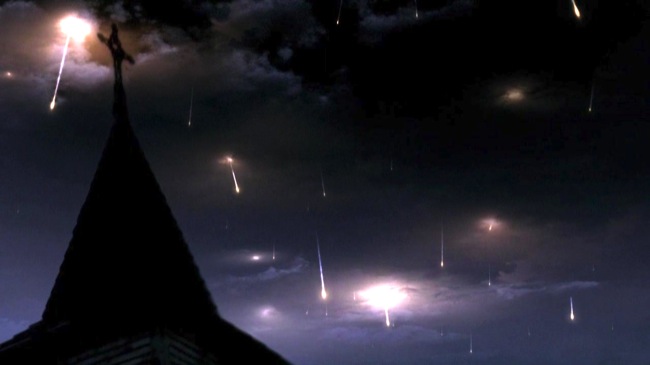
I’ll confess, my idea to update my angel meta by looking at what we learned about angels and how the show used them in seasons eight, nine, ten, and eleven turned out to be much harder than I expected. That wasn’t because of any depth or complexity in what the show presented. On the contrary: I submit it’s because – at least for me – the more we saw of angels, the less unique and interesting they became: they turned depressingly, humanly predictable and boring as simplistic sociopathic monsters, and died quickly if they developed empathy or emotional intelligence.
In this article, I’m going to look at my – admittedly challenged – understanding of Heaven, and what happened when Metatron cast the other angels out of Heaven. I’ll explore the story arcs of some individual angels. I’m also going to speculate a bit about how and why angels lost the fascination they had for me when Castiel was first created.
I already wrote my best understanding of the show’s overarching cosmology, and I’d encourage you to revisit that if you have the time. I noted there my problems with the way the show’s cosmology has … evolved? transmuted? mutated? … over time. I’ll admit, much of my current angelic disappointment relates to how absolutely impossible it is for me now to make any rational sense out of Supernatural’s metaphysical universe. I’ll also freely admit it’s silly to look for logic in fantasy and magic, but that’s the way I’m built. With that said, let me start with what happened at the end of season eight and beginning of season nine …
The Non-Men Who Fell To Earth
Truth in advertising: from the moment “Heaven And Hell” aired, I loathed (and frankly laughed almost hysterically at) Kripke’s conceit that Heaven was physically located up in the sky and falling angels (and their separated grace, in Anna’s specific situation) would be seen from Earth as meteors streaking through the sky. Say what? Heaven, Hell and Purgatory as physical places with quantifiable coordinates in our universe, at least as opposed to being some quantum dimension degrees off from our observable, physical reality, have always been absurd to me. Ahem.
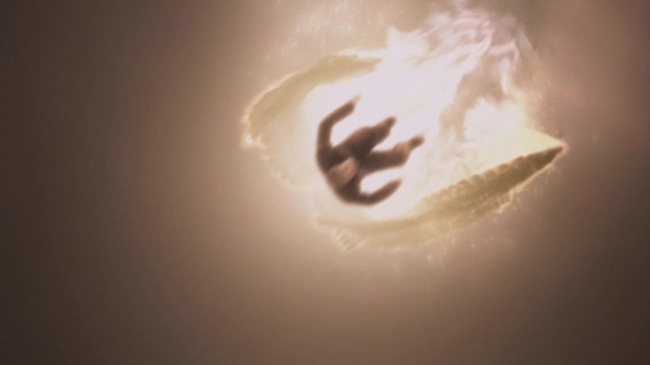
Putting that aside, the image of human-shaped angels with actual feathered wings falling in flames was a cool visual, but not one that worked for me. I couldn’t help but ask – since angels (apparently apart from rebels and cupids) had supposedly been banned from taking human hosts since biblical days (remember “young” Uriel’s observation to Anna in “The Song Remains The Same”?) – why did we see them all as winged human forms falling in fire? Had all the angels grabbed hosts and ridden them to Heaven during the post-apocalypse and pre-exile wars? Okay, maybe human perceptions drove that impression – maybe we, as human viewers, could only ever perceive angels as having human shape, the same way Zachariah noted in “Dark Side Of The Moon” that even in Heaven, Sam and Dean saw him in his human businessman form because they were still limited to human-style perception that denied them the view of his six wings and four faces, one of which was a lion – but that still irritated me to the point that I scoffed at the VFX instead of enjoying the image. (Mind you, I very much enjoyed the later image of the shadows of burned, shredded wings employed to illustrate how angels had been transportationally crippled whenever they manifested their post-exile grace; that was impressive.)
With that particular visual gripe out of the way, beginning in “I Think I’m Going To Like It Here,” we saw exiled angels who took human vessels willy-nilly (Hael, tractor angel, family husband/father cereal-eating angel, Gadreel’s bartender host, etc.), only to discover that once they were in human bodies, they could no longer relocate themselves at will; instead, they were reduced to using human forms of transportation. Once in human bodies, they still perceived the essence of other angels inside their human vessels, but could recognize their identities only if they had known each other in Heaven; thus, the first angel to confront long-imprisoned Gadreel in the season nine premiere didn’t know who he was, and vice versa, but Gadreel and his friend Abner instantly knew each other in “Road Trip.” Apart from at-will transportation, they still had most of their angelic powers, including the ability to heal (Gadreel’s whole leverage for taking Sam as a vessel), and to smite demons. They still had grace and were still angels; they simply couldn’t access Heaven or apparently any means of non-physical travel until Metatron reopened one limited gate and began admitting his chosen servant/allies.

I wondered from the start why exiled angels bothered taking human vessels at all. From everything we learned in previous seasons of the show, angels had their own unique forms, however not perceptible (at least, without damage) by human senses. They only needed to take human vessels when they had to communicate with ordinary people. Anna told Dean in “Heaven And Hell” that she had been stationed on Earth, invisible, just watching, for 2000 years; she evidently wasn’t embodied during that whole time. Uriel in “The Song Remains The Same” noted all angels were “… under strict orders not to come down here, much less take a vessel.” By his own testimony in “Lazarus Rising,” Castiel came to the arrangement we saw with Jimmy Novak in “The Rapture” only after he repeatedly tried and failed to speak with Dean while in his normal, non-physical, angelic form, mistakenly believing Dean was one of the few special people – like poor Jimmy, as it turned out – who could hear him. In “The Third Man,” Castiel referred to having spent the year of Dean’s exile from hunting as a “multidimensional waveform of celestial intent;” in “Family Matters,” he told Samuel his true form was “approximately the size of the Chrysler building.” I’ve already mentioned Zachariah’s description of his true form.
My point is simply that all prior evidence indicates no angel ever had to take a human vessel unless and until it needed to communicate or interact with a human who couldn’t otherwise understand its angelic voice. They didn’t need human forms to communicate or interact with each other. So why did the exiled angels bother to grab human vessels at all, with all their inherent limitations, when they could apparently have remained in their own imperceptible forms, able to swirl invisibly around the world, albeit not with the instantaneous transportation abilities they had previously enjoyed? Some may have been like Balthazar, seduced by the allure of experiencing physical sensation, or like Anna, wanting to feel the full range of human emotion – but why would most have shackled themselves to human forms?
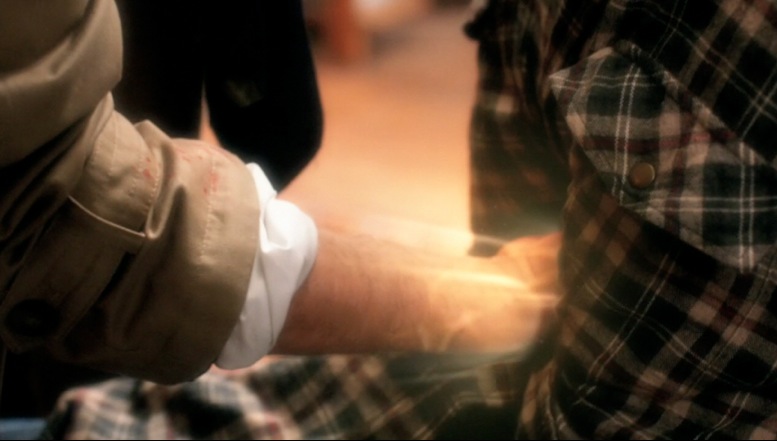
My best possible story-logic-driven guess is that, cut off from Heaven and the human souls powering it, the exiled angels might have needed close contact with an individual human soul to keep any remnant of their power. Mind you, I don’t have any evidence to support that, since it was never discussed in the show, but we do know that human souls had power angels could tap: just look at Castiel borrowing power from Bobby’s soul to return the brothers in “Frontierland,” using souls loaned from Hell by Crowley to defeat Raphael in “The Man Who Would Be King,” and acquiring godlike power when he accessed all the monstrous human souls in Purgatory in “The Man Who Knew Too Much.” Most recently, look at Castiel acquiring the power to momentarily surface after Lucifer touched Sam’s soul in “The Vessel” – his appearance was very brief, just long enough to warn Sam that Lucifer was wearing his vessel body, but it appeared that Sam’s soul-power was what gave him the ability to take control (although he declined even to try evicting Lucifer because he thought they needed Lucifer’s strength and knowledge to deal with Amara).
Under that theory, it’s possible the fallen angels, evicted and cut off from Heaven and its inherent soul power by Metatron, might have experienced a gradual deterioration similar to Castiel when he was exiled from Heaven by Zachariah’s faction in season five, unless they had access to the power of a human host’s soul. Deprived of his link to Heaven and – at least according to writer Robbie Thompson on Twitter – no longer sharing his physical body with Jimmy Novak’s soul since their first mutual destruction in “Lucifer Rising/Sympathy For The Devil,” Cas was unable by “Good God, Y’all” to do many things he’d been capable of before, including healing Bobby. By “Two Minutes To Midnight,” he couldn’t even transport himself; he also felt physical pain and discomfort, like any human.
I wonder whether the longer the fallen angels remained apart from the soul-power of human vessels, the weaker they became; that could explain why some even tried to enter willing but unsuitable humans with no genetic vessel heritage, such as the faith-blind, exploding volunteer of Buddy Boyle’s ministry in “I’m No Angel,” or imperfect vessels such as Hael’s young woman, whose physical body was deteriorating like Nick’s under Lucifer’s possession in season five.
Of course, the purely practical filming reason that absolutely required angels to take vessels was the writers’ need to have viewers able to see angels, since the whole season nine storyline was built around conflict between and among angels, demons, and humans. Angels needed human actor vessels if they were going to appear on-screen to further the story. And that gets me into the angels’ story itself, and how I think the production need for human actors to portray angels wound up warping that story and the very nature of angels themselves.
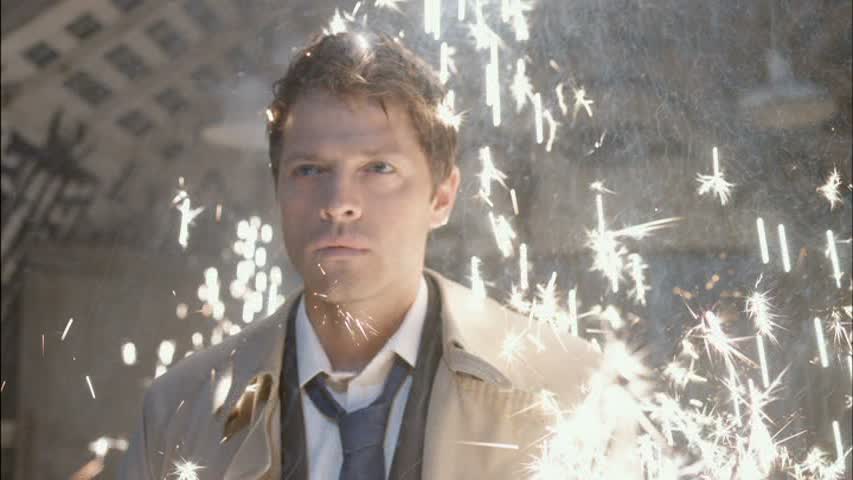
Physics and Metaphysics
We derived our initial impression of angels in the show solely from Castiel, the only angel we met for the first six episodes of season four. He was fierce, powerful, and emotionally distant, unquestioningly loyal to the dictates of Heaven, perfectly faithful to the will of God, imbued with appreciation for all of God’s works, and thoroughly fulfilled by embodying his role as a guardian of creation. He was our first template for all angel-kind, the show’s manifestation of one traditional biblical illustration of angels as warriors of God with flaming swords barring Adam and Eve from returning to Eden and separating the faithful from the damned at the end of days.
It wasn’t until the introduction of Uriel in “It’s The Great Pumpkin, Sam Winchester” that we learned Supernatural’s Heaven – like everything else supernatural in the show – wasn’t remotely what we expected. Kripke’s genius move was to take God out of Heaven without explanation, leaving behind a power vacuum that would inevitably produce conflict as the gradually growing stress of uncertainty inspired disparate factions and competing ideas to strive for control. Uriel’s utter disdain for humans was our introduction to angelic divisions and politics, and ultimately to our discovery that the independent machinations of relatively few discontented angels highly placed in Heaven’s bureaucracy – the only ones aware of God’s extended absence, hiding it from all others to retain their positions – were behind all the circumstances giving rise to the premature apocalypse of season five.
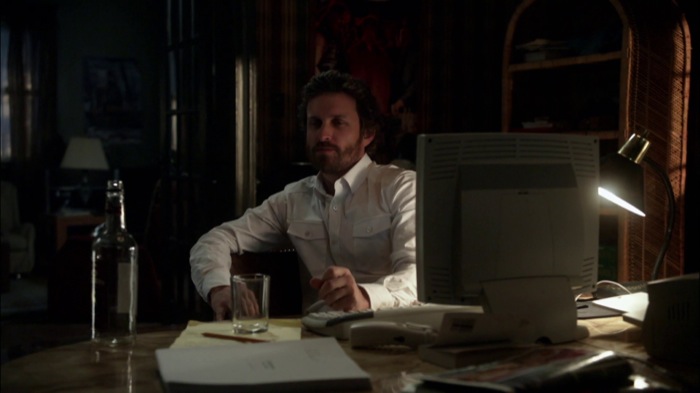
Kripke’s particular vision ended with the Winchesters and their allies short-circuiting the angel-driven apocalypse through human family love and sacrifice, to the evident approval of God-in-Chuck form before he disappeared again. But since the show didn’t end there, succeeding showrunner Sera Gamble expanded on the idea of God’s continuing absence to carry the story of angelic conflict forward through seasons six and seven, also establishing the concepts that (1) human souls were the currency of power keeping the whole system running (“My Heart Will Go On”) and (2) God had left coded operational manuals hidden on Earth for human prophets to use if they needed help in dealing with certain aspects of creation (“Reading Is Fundamental”).
So in season six, trying to prevent Raphael from reinstating the apocalypse, Castiel was seduced into partnership with Crowley to locate Purgatory in an attempt to gain enough soul-power to be able to go toe-to-toe with an archangel for control of Heaven. Acquiring a godlike level of corrupted power from all the monster souls he absorbed, insane Castiel flat-out seized Heaven in season seven, only to leave behind widespread devastation and another power vacuum when he returned the Purgatory souls but released Leviathan – beings more powerful and older than angels – on Earth.
For all that an ongoing civil war between angels in Heaven was the backdrop and inspiration for the action in season six, however, we never saw much of it. Apart from the introduction of rogue libertine Balthazar in “The Third Man,” the inter-angel conflict played mostly behind-the-scenes until late in the season, with Castiel simply reporting from time to time that he was in a war going badly. “The French Mistake,” “My Heart Will Go On,” “Frontierland,” and finally “The Man Who Would Be King” laid the conflict bare, revealing Castiel’s motives and duplicity and illustrating his impact on Heaven as a whole through Rachel’s journey from becoming Castiel’s wonder-filled loyal follower to his would-be executioner and Balthazar’s conversion from free spirit to compatriot to betrayer.
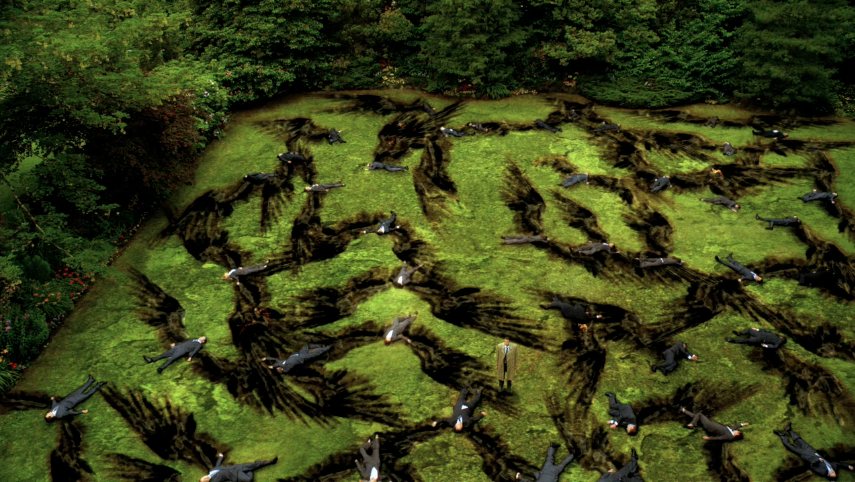
The turmoil in Heaven played even less of a role in season seven as the show’s focus shifted to Leviathan trying to create their Soylent Green version of Earth. In the very beginning of the season, we saw the horror of insane Castiel’s wholesale destruction of angels who had opposed him, but with Cas’s apparent death, we lost all contact with events in Heaven. We heard nothing else until the brothers uncasing the Leviathan tablet in “Reading Is Fundamental” woke Kevin as a prophet and brought Hester, Inais, and others of the garrison to protect him. However bitter about the damage Castiel had caused, they were more focused on their ordained mission, so all we learned was that relatively few angels remained alive, the situation in Heaven was confused, and Leviathan could kill angels. We were left to imagine it almost all on our own.
Inheriting the showrunner mantle in season eight and continuing through the current season eleven, Jeremy Carver chose to bring the angel wars front and center, focusing the story on angels and their machinations. He added a new wrinkle: he characterized angels as constructs with code-driven operating systems that could be mechanically hacked and reprogrammed, like a computer. He introduced Naomi as a long-behind-the-scenes manipulator who, rather than using soul-power or persuasion to build her power base, tampered directly with other angels’ memories and perceptions to keep them in line with the orders of whatever cabal ruled in Heaven, and emerged from the shadows to take control herself once the archangels were gone. He established Metatron – season seven’s angelic scribe of the Word of God from “Reading Is Fundamental,” and an archangel according to his side-note in “A Little Slice Of Kevin” – as instead being a low-ranking secretary who fled God-less Heaven to escape the archangels and Naomi’s meddling, and eventually decided to take his revenge on them by ascending to the throne of Heaven himself and exiling all other angels to Earth.
I’ll admit, many of these turns of events bothered me. Heaven as hackable code traced back to Kripke’s era and “Dark Side Of The Moon,” with Ash opening his own unauthorized doors between the individual heavens of various souls, but angels being mechanically hackable, and by purely physical tools? As Naomi pointed in “The Great Escapist,” her purported machinations effectively rendered all of Castiel’s memories void and unreliable – including everything that went into his decision to rebel against Zachariah, and later to pursue Purgatory souls. In essence, that reduced Castiel, and every other angel, to nothing more than puppets or defective computers: beings whose supposed choices were meaningless because they could have been either programmed or externally manipulated.
It particularly irritated me that angels could be brain-hacked by physical torture inflicted on their human vessels, as Crowley brutalized Samandriel in “Torn And Frayed” and later took on Gadreel inside Sam in “Road Trip.” While most injuries to their human vessels were irrelevant to angels – witness Castiel’s utter disregard of being shot and stabbed in “Lazarus Rising” – direct physical combat with a sufficiently powered individual could have deleterious consequences for an angel, as we saw when Alistair and then Uriel beat Castiel in “On The Head Of A Pin,” for example. Injuries inflicted with an angel blade or a weapon made from an angel blade, like the bullets Crowley used in “The Great Escapist,” evidently touched an angel’s grace and harmed the angel along with its vessel. Magically spelled restraints that worked on angels in human vessel bodies were apparently something devised by those mysteriously omnipotent witches that kept turning up in the show, to my steadily increasing dismay; presumably an extension of the “extra crunchy” hex bags introduced in “Heaven And Hell” and the anti-angel warding that first appeared in “Death Takes A Holiday.” But ordinary physical metal pins inserted into a human vessel’s brain not bleeding out grace but directly stimulating something corresponding to brain cells in an angel’s restrained multidimensional consciousness? That pushed something I already thought was reaching (and admittedly didn’t like) into a realm that beggared my imagination.
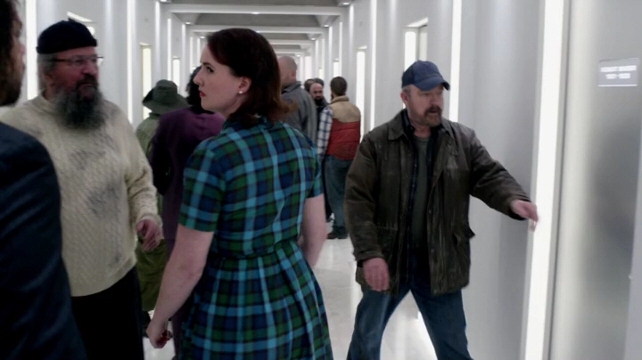
Also with Naomi in season eight, for the very first time we started seeing Heaven as having a distinct architectural style and physical structure of its own. Whenever we had seen Castiel or other angels in Heaven in prior seasons, it was always in surroundings borrowed from the specific visions of Heaven created by individual human souls; recall Castiel’s fondness for the eternally beautiful Tuesday afternoon of an autistic man, arrogant Raphael’s preference for Ken Lay’s expensively elegant study, and Zachariah invading the brothers’ Heaven scenarios. Heaven, we were told in “Dark Side Of The Moon,” wasn’t a place; instead, it was the shared imagination creation of every soul, overlapping in common areas – each individual soul had a conception of the Garden and the Road, for example – but nonetheless unique in all its myriad details and separate from the Heavens of others. Naomi’s sterile office might have been the ideal of some rich accountant, but the endless hallway of discrete rooms labeled with the names of souls in “Inside Man” was something different; it said there was a backstage area behind the myriad “heavens” of souls, an area populated by the servant angels who kept things running. Since we saw that first through Bobby’s eyes, it might just have been Bobby’s idea of Heaven’s “angel staff only” area, but the prison springing up around Castiel and Gadreel in “Do You Believe In Miracles” bore no relation to any human Heaven; stone cages with bars are instruments of nightmares, not desired dreams, and there were no humans present to be providing the thought-structure. Yet despite the surroundings being intended for angels, all the structures were very much human. And their intrinsic physicality was what prompted Gadreel to blow himself to kingdom come in order to shatter the bars and walls of Castiel’s prison.
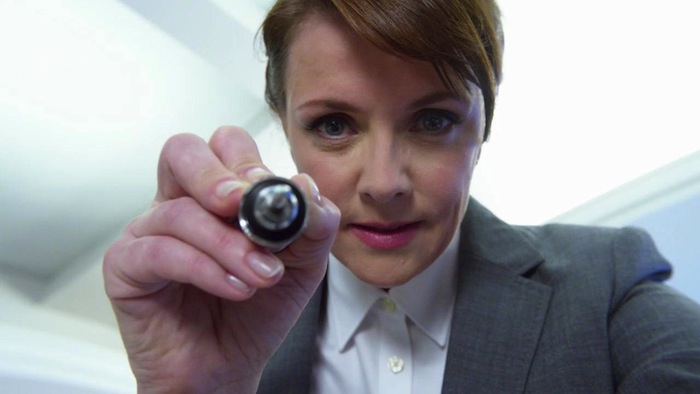
This idea of Heaven having intrinsically physical, architecturally human components, especially Naomi’s tool-based brain-torture of Castiel and Metatron in her office/workshop and the stone prison cells, triggered my biggest squick: the constant depiction of angels in Heaven as always being in human bodies with human-style weaknesses. I know those images were inevitable, given the need for human actors to appear on our TV screens to let us follow the Heaven storylines, but I think that very imagery made the writers themselves increasingly perceive angels as being essentially human. I can’t help but think that bled over into the writing of the episodes and steadily diminished every alien component that had made angels fascinating to me in the first place. The more we learned about angels, the more human they became, right down to being motivated by purely human drives and emotions and indulging in blatantly human political posturing and contests. The very human nature of demons never bothered me, given that we learned they were nothing more than the debased souls of humans who ended up in Hell, but angels began as a totally separate creation; them becoming steadily less unique and increasingly human as we kept seeing more and more of them made them less and less interesting to me. There’s an old adage about familiarity breeding contempt; it seems to me that’s what happened here.

I also think that was what generated the utterly loathsome – to me, anyway – idea that “grace” was the only difference between angels and humans; that an angel deprived of grace, like Anna, Castiel and most recently Metatron, somehow simply became human and miraculously acquired a soul (at least according to Metatron telling Cas in “Sacrifice” to seek him out when Cas’s soul arrived in Heaven after his human death), despite angels famously not having souls, as Cas pointed out to Crowley in “The Man Who Would Be King.” And how is it that Anna’s recovery of her grace destroyed her human body in “Heaven And Hell” – as she herself noted later in “On The Head Of A Pin,” saying the re-creation of her atomized human body had been a favor (umm, who could have done that, with no template at all to rebuild, unlike Cas restoring Dean from his buried remains?) – while Castiel’s ingestion of stolen grace in “Holy Terror” and his later recovery of his own grace in “Book Of The Damned” left his physical human form perfectly intact? Was it simply that Castiel’s season-five-plus “Jimmy-less” body was a God-built construct ever since Cas’s very first resurrection, and had been built to tolerances beyond the simply human? I’m hand-waving madly over here …
My problem with this very human depiction of angels carries over into the current season. Lucifer hasn’t had a human vessel since Castiel snatched Sam’s body out of the cage back at the very end of season five/beginning of season six. When Rowena worked her magic to pull Luci into her “visitors area” version of the cage in “O Brother Where Art Thou” and “The Devil In The Details,” us seeing him in Nick’s – well, Mark Pellegrino’s – body was purely a production choice to feature a known actor in a role he’d played so memorably before. It made a certain amount of sense, if only because Sam’s perceptions were probably in the driver’s seat for us viewers, and Sam had first met Lucifer wearing Nick’s meatsuit and always hallucinated him that way – something definitely preferable for him to imagining Luci as a warped version of Sam himself! – but what did Rowena and Crowley see? Why would Rowena, in particular, have dreamt of Lucifer wearing Nick’s meatsuit, which she had never seen and which was left rotting on a hotel floor back in season five? Why would imperfect, rapidly deteriorating Nick have been Lucifer’s choice of body image? Only because the production office wanted to use Mark Pellegrino again, as they’d earlier wanted to use Julie McNiven to bring back Anna.
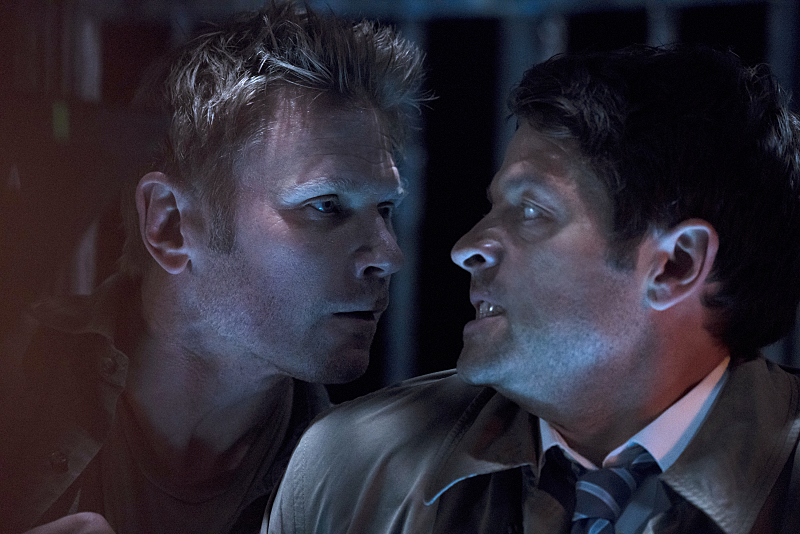
If we, later in this season, see Castiel in Hell’s cage being portrayed by Mark Pellegrino (pretending to be Misha playing Cas in Nick’s body) as we currently see Lucifer being portrayed by Misha Collins (pretending to be Mark playing Luci in Jimmy’s former body), I’m going to throw something soft and non-damaging at my expensive TV screen, only because my mental health and my TV are worth more than my fannish irritation. My first reaction was immediately to note that Lucifer had no vessel to exit or to be possessed by any other angel, so if Luci and Cas effectively changed places through Rowena’s spell (as opposed to Cas – who perhaps still has a soul now, as well as his grace? – possibly sharing his body with Luci, as Sam did with Gadreel), we’d better see some recognizable form of Castiel, not Lucifer, in Hell’s cage. “The Vessel” apparently demonstrated that Cas is, instead, somehow sharing his not-quite-human body with Lucifer, and has the same ability as human Sam did both to surface and exert control, or evict the devil-angel from his body if/when Lucifer does something he both knows about and can’t support.



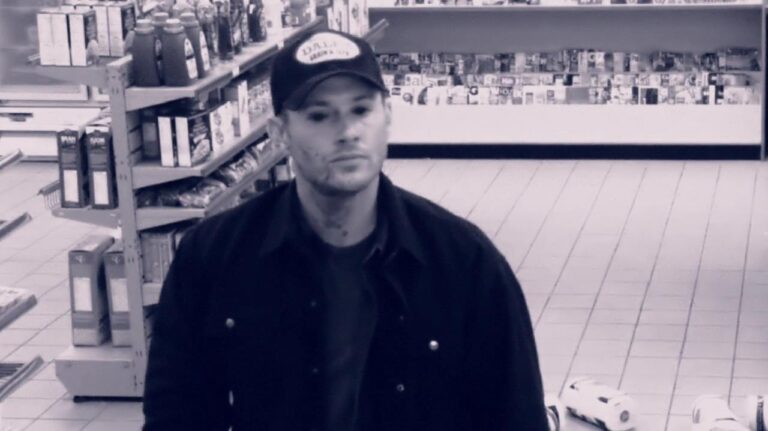
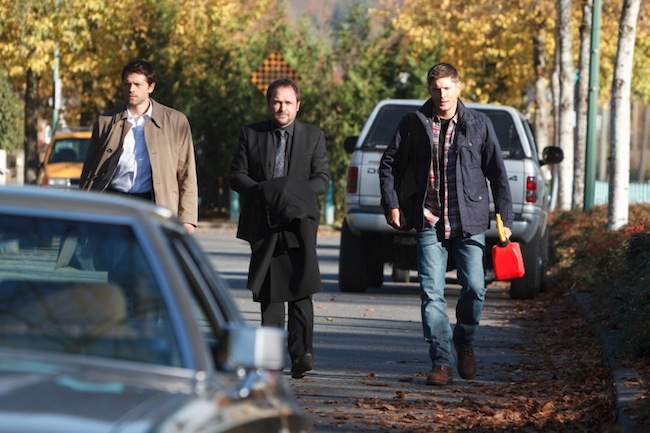
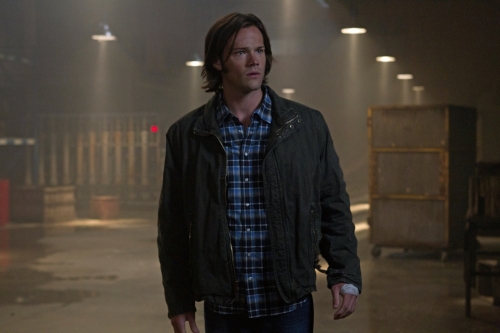
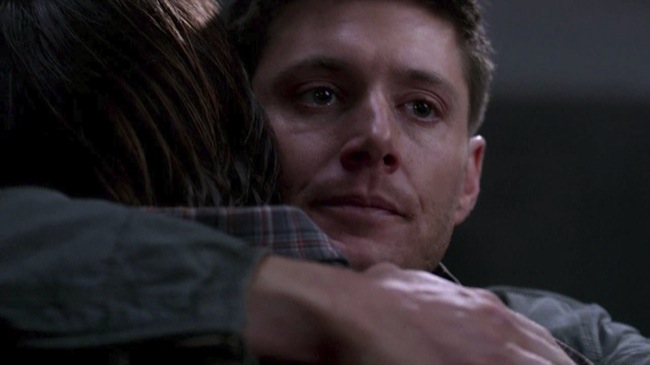
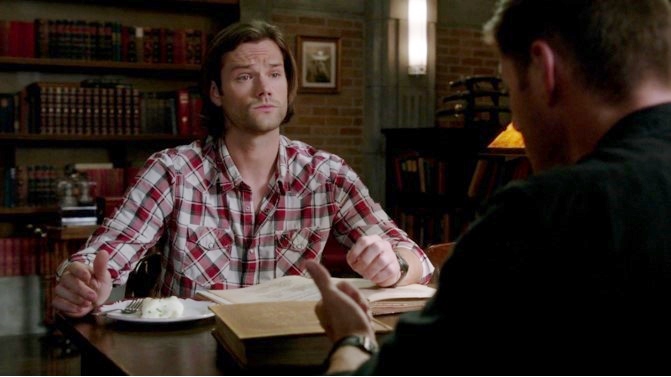
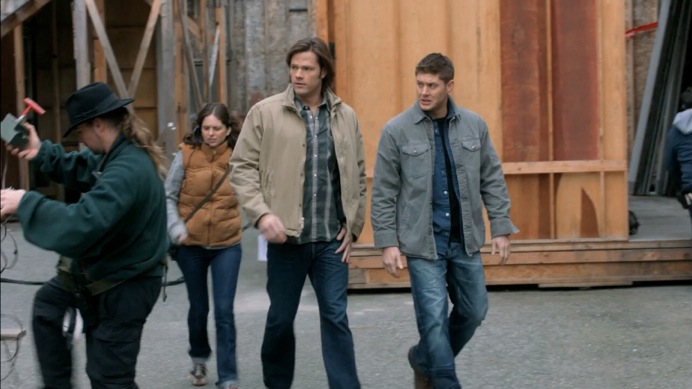
Leave a Reply